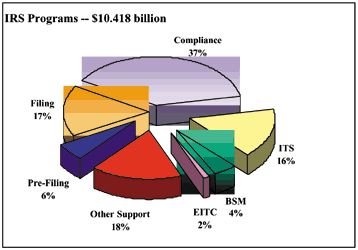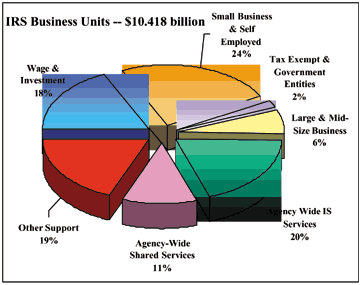|
February 01, 2002
Fiscal Year 2003 IRS Budget Request
Summary
The IRS total budget request for FY 2003 is $10.418 billion and full-time equivalent employment (FTE) of 101,080. The request is $482 million more than last year´s $9.936 billion budget. The increase maintains momentum in the IRS Business Systems Modernization projects with $58 million and provides $40 million to fund legislative proposals in the President´s budget request. The remaining increase is just 3.9 percent more than last fiscal year´s financial plan and is necessary to improve customer service, compliance and meet workload increases.
FY 2003 IRS Budget Request ($ in Millions)
Appropriation: FY 2002* FY 2003 Diff.
---------------------------------------------------------
Processing, Assistance $3,983 $4,150 $167
& Mgmt.
Tax Law Enforcement $3,786 $3,988 $202
Information Systems $1,621 $1,676 $55
Investment Technology $392 $450 $58
Account
EITC Compliance Initiative $154 $154 $0
TOTAL Proposed IRS
Dollars $9,936 $10,418 $482
FTE 99,901 101,080 1,179
*Includes Legislative Proposal amount ($466 million) for comparability.
Budget Building Blocks
There are four budget building blocks:
- World Class Level of Service
- Modernization
- Maintain Current Operations
- Legislative Proposals
World Class Level of Service
Initiatives to enhance customer service and compliance, and address workload increases total $260 million. Most of the cost for these initiatives, $158 million, comes from an unprecedented reduction in resources within the base budget and the remaining $102 million is a budget increase. This reduction results from the agency´s new strategic planning process. The process is designed to support decisions about which goals and strategies should drive the agency in achieving its mission, how it allocates resources to achieve those goals and how it evaluates results. Additional FTE are needed to increase customer satisfaction and meet workload requirements.
The budget calls for savings of 2,287 FTEs and an increase of 3,466 FTEs for a net increase of 1,179. Several program areas will benefit from the increased FTE:
Compliance strategies will help stabilize audit rates, increase audits of abusive trusts, address mounting employment and income tax gaps, enhance K-1 matching efforts, generate better fraud referrals and continue aggressive pursuit of money laundering schemes.
Workload increases are expected in the Offer-in-Compromise program. In addition, there will be continued demands for live interaction with telephone assistors and continued growth in the number of returns filed.
Modernization
A $58.4 million increase during FY 2003 maintains the modernization of the business processes and the technology improvements currently underway. Business System Modernization projects are long-term, system-wide projects. Modernization of the IRS business processes is required to improve customer service and voluntary compliance, and to update the current outdated information systems.
Tier B investments – A $10 million increase is required to complete projects with work in progress and for new projects targeted for FY 2003. Tier B technology improvement projects are smaller in scope than Business Systems Modernization projects. Individual business or operating units own these projects and they are generally completed within two to three years.
Maintain Current Operations
Increases are requested for:
Maintaining Current Level of Services – $295 million – Required to maintain FY 2002 program levels in FY 2003 by funding pay, benefits and non-labor inflationary costs. Within-grade Increases – A $37 million increase covers the costs of within-grade pay increases for current employees. Homeland Security Annualization – $10 million and 14 FTE – For the enhanced security arrangements required according to the Homeland Security Supplemental.
Savings in this area include:
Homeland Security Non-recurring Costs – Funding of $31 million from FY 2002 does not recur in FY 2003. Business Strategy Adjustment – Treasury´s approach to better business practices that encourage bureaus to review current efforts and to remove or reduce those that do not have significant program value is expected to save $39 million.
Legislative Proposals and Other Adjustments
An increase of $37 million reflects the impact of recommendations contained in the President´s FY 2003 budget. The President´s budget proposes legislation that would require agencies to be responsible, effective in FY 2003, for the costs of: (1) Liabilities related to Civil Service Retirement System retirement costs and health benefits of retirees, and (2) the cost of services provided by General Services Administration, the National Archives and Records Service and the Department of Agriculture. These actuarial liabilities have been borne by a permanent, indefinite appropriation overseen by the Office of Personnel Management. This change will more accurately capture the true full cost of programs within this appropriation.
The President's FY 2003 budget proposes legislation to permit the Department of Labor to add an administrative surcharge to the amount it charges each agency for its Federal Employees' Compensation Act (FECA) benefits. A $3 million increase covers this surcharge. The Department of Labor previously bore this administrative cost. The proposal transfers the responsibility and corresponding budget authority to each client organization.
Perspectives on IRS Funding Request

- Post-Filing Compliance programs account for 37 percent of the IRS budget and include functions such as Payment Compliance, Field Examinations, and Criminal Investigations, with an FTE of 46,872, an increase of 597 FTE from FY 2002 levels.
- ITS – Information Technology Services
- BSM – Business Systems Modernization
- EITC – Earned Income Tax Credit

- The four major business units in the IRS, Agency Wide Shared Services and Information Systems comprise more than 81 percent of the IRS budget and account for 88,578 FTE.
Previous | Next
2002 IRS News Releases | News Releases Main | Home
| 